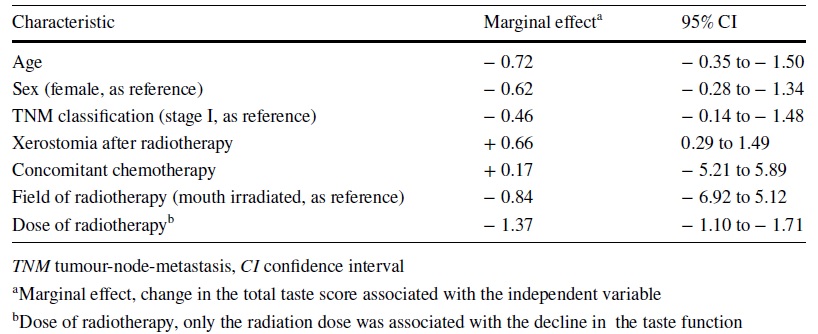글로벌 연구동향
방사선종양학
- 2020년 12월호
[Eur Arch Otorhinolaryngol.] Prospective assessment of gustatory function after radiotherapy for head and neck cancers연세의대 / 이은정*, 박동준*
- 출처
- Eur Arch Otorhinolaryngol.
- 등재일
- 2020 Oct
- 저널이슈번호
- 277(10):2745-2751. doi: 10.1007/s00405-020-06051-2. Epub 2020 May 24.
- 내용
Abstract
Background: Taste disorders are major causes of morbidity in patients undergoing head and neck irradiation. We quantitatively assessed the gustatory function of patients with head and neck cancers who underwent radiotherapy using recently developed standardised tools for measuring taste.Methods: Twenty patients undergoing head and neck irradiation responded to a specific questionnaire and were assessed by olfactory and gustatory function tests. To assess changes over time, testing was performed before, immediately after, and at 2- and 4-week intervals following the start of radiotherapy. Concurrently, patients were evaluated for xerostomia from radiotherapy.
Results: A decrease in the taste recognition threshold was observed in the second week after the beginning of radiotherapy. The taste detection threshold improved within the 14th-18th week. Most affected patients demonstrated that their gustatory function primarily decreased independent of the olfactory function. Disturbances in taste were exponentially worsened beyond an accumulated dose of 30 Gy and involved all tastants. According to a multivariate analysis, radiation-induced taste impairment was not influenced by the degree of xerostomia. However, there was an association between the dose of irradiation and the severity of taste disturbance.
Conclusions: In this preliminary study, we found that the taste function was worse 2 weeks after the start of radiotherapy and returned to pretreatment levels within 4.5 months. Taste disturbances were exponentially worse beyond an accumulated dose of 20 Gy. Taste dysfunction after radiotherapy was not influenced by the degree of xerostomia, whereas only the dose of irradiation was associated with the severity of taste dysfunction.

1) 방사선치료 진행 중 전향적 미각 변화

2) 다변량 분석 : 미각 기능 변화에 영향을 주는 요소 분석
Affiliations
Eun Jung Lee 1 , Chi Sang Hwang 2 , Hui Joon Yang 2 , Hee Sung Chae 2 , Hyun Jong Jeon 2 , Dong-Joon Park 3
1 Department of Otorhinolaryngology, Yonsei University Wonju College of Medicine, Ilsan-ro 20, Wonju, South Korea. starlej@yuhs.ac.
2 Department of Otorhinolaryngology, Yonsei University Wonju College of Medicine, Ilsan-ro 20, Wonju, South Korea.
3 Department of Otorhinolaryngology, Yonsei University Wonju College of Medicine, Ilsan-ro 20, Wonju, South Korea. rhico@yonsei.ac.kr.
- 키워드
- Head and neck cancer; Olfaction; Prospective; Radiotherapy; Taste; Xerostomia.
- 연구소개
- 본 논문은 방사선치료를 받은 두경부암 환자의 방사선치료 진행 과정 중 전향적 미각 기능 변화 및 구강 건조증 발생에 관해 연구한 논문입니다. 연구 결과, 방사선치료 시작 2주 (방사선 누적조사량 20Gy) 가 지나면 미각 기능이 급격히 감소하기 시작하고 치료 종료 4.5 개월 내 치료 전 미각 기능으로 회복되는 경향을 보였습니다. 다변량 분석 결과 구강 건조증 발생이 미각 기능 저하에 미치는 영향은 적으나, 총 방사선 조사량은 미각 기능 저하와 연관성이 높게 나타났습니다. 본 논문은 두경부암 방사선치료를 시행하는 환자를 직접 면담하는 이비인후과, 방사선종양학과 임상의에게 소개 및 도움이 될 만한 정보라 생각합니다. 나아가 두경부암 환자의 방사선치료를 시행하기 전 환자에게 미각 기능 변화에 대한 설명이 필요할 것으로 생각합니다.
- 덧글달기
- 이전글 [Clin Mol Hepatol.] Stereotactic body radiation therapy for small (≤5 cm) hepatocellular carcinoma not amenable to curative treatment: Results of a single-arm, phase II clinical trial
- 다음글 [Int J Radiat Oncol Biol Phys.] Combined NK Cell Therapy and Radiation Therapy Exhibit Long-Term Therapeutic and Antimetastatic Effects in a Human Triple Negative Breast Cancer Model








편집위원
두경부암환자에서 방사선치료시 미각이 둔화되어 점막염증상과 함께 식욕감퇴를 호소하는데, 12명의 작은 환자수이지만 이러한 미각변화를 객관적인 수치로 제시했다는 점에서 흥미롭습니다.
덧글달기닫기2020-12-02 10:37:45
등록